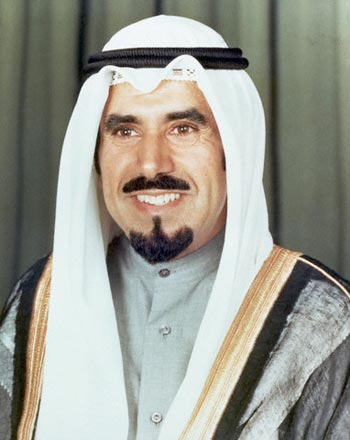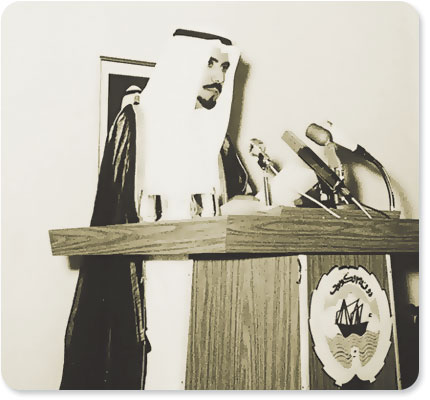<Back to Index>
- Emir and 13th Sheikh of Kuwait Jaber III al-Ahmad al-Jaber al-Sabah, 1926
PAGE SPONSOR


Jaber III al-Ahmad al-Jaber al-Sabah, GCB (Hon), GCMG (Hon) (29 May 1926 - 15 January 2006) (Arabic: جابر الأحمد الجابر الصباح) of the al-Sabah dynasty, was the Emir and thirteenth Sheikh of Kuwait, serving from 31 December 1977 until his death on 15 January 2006. The third monarch to rule Kuwait since its independence from Britain, Jaber had previously served as Minister of Finance and Economy from 1961 until 1965, when he was appointed Prime Minister prior to becoming Kuwait's ruler.
Jaber is most famous for having been monarch of Kuwait during the 1990 Ė 91 Iraqi invasion of his country, which led to the Gulf War in which his country was liberated by an international coalition acting under United Nations sanction, composed of troops from the United States, Saudi Arabia, the United Kingdom and France, together with forces from several Arab states.
Jaber was born in Kuwait City. Sheikh Jaber (of the Al-Sabah dynasty, which has ruled Kuwait since the 18th century) was the third son of the late Sheikh Ahmad Al-Jaber Al-Sabah, who served as Kuwait's emir from 1921 to 1950.
Sheikh Jaber received his early education at Al-Mubarakiya School, Al-Ahmediya School and Al-Sharqiya School, and was subsequently tutored privately in religion, English, Arabic and the sciences.
In 1961, he was appointed as Kuwait's Minister of Finance and Economy. In this position, Sheikh Jaber was tasked with putting the new Kuwaiti dinar into circulation and establishing the Kuwaiti Currency Board, of which he was the chair. As minister, Jaber adopted, and was the first chairman of, the Kuwaiti Fund for Arab Economic Development from 1962 Ė 1964. The Fund provides financial and technical assistance to developing countries. The country's oil revenues transformed it from a largely tribal society to a modern, urbanized state with one of the world's largest per capita incomes. During this time, the Fund expanded to aid five countries and gave loans to another eight. The money going into the fund came from oil earnings, with virtually all of it being sent outside Kuwait. He is also credited with the formation of the Fund for Future Generations. This fund takes ten percent of the countryís oil revenues and invests it for when the oil resources are depleted. However, the Kuwaiti government used both funds (Kuwaiti Fund for Arab Economic Development and Fund for Future Generations) during the Arabian Gulf War when it was used to help fund the government - in - exile. Jaber remained Minister of Finance and Economy until he was appointed Prime Minister in 1965. A year later, he was named Crown Prince and became Emir of Kuwait in 1977.
Kuwait found itself geographically in the middle of the Iran - Iraq War that took place from 1980 to 1988. It sided with Iraq out of fear of what could happen if Iran succeeded in taking over areas of Iraq as well as apprehension over Ayatollah Khomeiniís revolutionary rhetoric. In 1985, Kuwait became a direct target in the war when a terrorist group, the Islamic Holy War, attacked Sheikh Jaberís motorcade, leaving him uninjured but killing two bodyguards and a bystander, in addition to the suicide bomber. It was discovered that the group had ties to Iran. The group was demanding the release of seventeen convicted terrorists who were being held in Kuwaiti prisons. Throughout the war, Kuwait suffered from many security threats, including a series of bombings. In 1986, one year after the attack on Sheikh Jaberís motorcade, there was an attack on an oil installation, which almost caused the shutdown of Kuwaitís oil industry. Members of the cabinet grew increasingly angry over the situation, believing that their role was to protect the citizens of Kuwait. They believed that they were not fulfilling their roles as government officials and that more should be done to protect the citizens. Therefore, the entire cabinet resigned as a sign of opposition towards the policies of Sheikh Jaber that had led to the security breeches in Kuwait and to show that they believed that more should be done. Two days later, Sheikh Jaber unconstitutionally dissolved the Parliament (which was not reinstated until 1991) and several articles of the Constitution (including freedom of the press), citing security concerns. Sheikh Jaber then appointed a new cabinet, which included many of the previous members, showing the emirís faith in the previous officials. In addition to the security concerns, the war also had economic implications for Kuwait. There was a drop in oil prices as well as Iranian attacks on Kuwaiti oil tankers that were trying to transport oil to the United States. This problem was dubbed the 'tanker wars' and resulted in Kuwaiti ships flying US flags.
After much discussion of a border dispute between Kuwait and Iraq, Iraq invaded its smaller neighbor on August 2, 1990 with the stated intent of annexing it. Apparently, the task of the invading Iraqi army was to capture or kill Sheikh Jaber. However, the Iraqi army was never able to accomplish this goal because Sheikh Jaber and his government escaped to Saudi Arabia within hours of the invasion; in Saudi Arabia they ran the Kuwaiti government from exile in a hotel in Dhahran. The Kuwaiti government - in - exile was one of the most effective governments to ever operate in exile. From the mountainous city of Taif resort in Saudi Arabia, Sheikh Jaber set up his government so that its ministers were still in control and were in constant communication with the people still in Kuwait. The government was able to direct an underground armed resistance made up of both military and civilian forces and was able to provide public services to the Kuwaiti people who remained, such as emergency care through the funds that it had saved from oil revenues. Sheikh Jaber also received help from a United Nations mandated coalition led by the United States. Jaber and his government lobbied hard and supported military action against Iraq before and during the Gulf War. When the war ended on February 28, 1991, Sheikh Jaber remained in Saudi Arabia while declaring three months of martial law, causing the accusation that he was trying to monopolize too much power for the small constitutional monarchy. By declaring martial law, those who were appointed to government positions were able to ensure the safety of the people. By imposing martial law, government officials were able to ensure that there were no Iraqis still in Kuwait who may have attempted to once again overthrow the government. They were also tasked with making sure that the country was safe enough for Sheikh Jaber and his government to return, which they eventually did on March 15, 1991. Sheikh Jaber held additional advantages in comparison to most leaders who have been forced to deal with invasions, as he had the loyalty of the Kuwaitis who were both in the country and those who had fled. After a great deal of international sponsored post war diplomacy, in 1994, Iraq accepted the UN demarcated border with Kuwait on the basis of the 1932 and 1963 agreements and UN Security Resolutions.
While in exile during the Persian Gulf War, Sheikh Jaber promised women the right to vote and run for office after Kuwait was liberated. However, it was not until May 15, 2005 that the parliament passed the law allowing women to vote and hold office after long years of pressure was placed on Jaberís Prime Minister, Sheikh Sabah al-Ahmad al-Sabah. It had taken many tries before the law was passed. The movement started when Sheikh Jaber took the opportunity of having a dissolved parliament to issue a decree allowing women to vote in the 2003 election. He then suffered from a backlash from the parliament when they rejected the 1999 measure that would have given women the right to vote and run for office. Lawmakers claimed that it was not that they opposed the measure rather it was out of protest because it was legislated by decree. Following the passage of the law, women were able to vote and run for office for the first time in June 2006. More than 195,000 women voted and twenty - eight ran for seats in the parliament.
The people of Kuwait loved Sheikh Jaber to the extent that they
referred
to him as 'Baba Jaber', meaning Father Jaber. His actual family is
quite complex; it is unclear how many wives he had. He had more than
forty children, certainly worthy of the cognomen. In September 2000,
Sheikh Jaber Al-Ahmed Al-Sabah suffered from a stroke and went to the
United Kingdom for treatment. Five years later, he died on 15 January
2006, aged 79, from a cerebral hemorrhage. He was succeeded by the Crown Prince Saad Al-Abdullah Al-Salim Al-Sabah. The government announced a 40 day period of mourning and closed for three days.